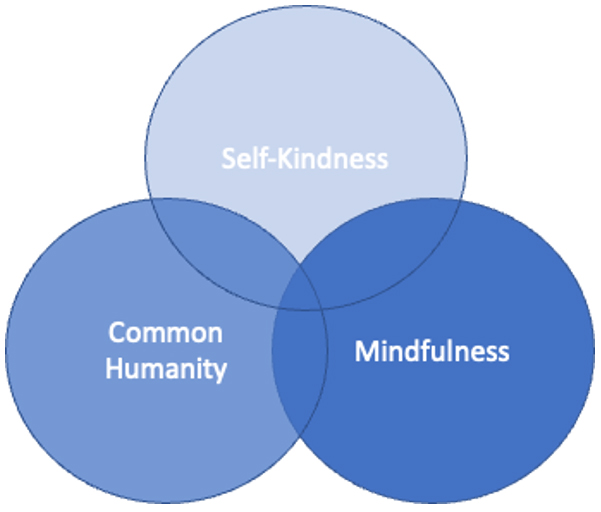
23 June 2023
Eike Tischer, a member of the Coaching Psychology Special Interest Group and a qualified mindfulness teacher, shares key findings from her master’s dissertation.
This is the final post in my mini-series about the role of mindfulness in coaching. Previously, I have discussed how mindfulness practice can support coaches in controlling their attention, in raising their awareness and in regulating mental and physical processes in coaching.
Considering the importance of self-care for helping professionals, this post explores how mindfulness can enhance coaches’ wellbeing through the adoption of mindful habits and practices. Their wellbeing can be further supported by the cultivation of self-compassion, in particular when coaches reflect on their practice. Here, I am sharing findings from my recent MA dissertation research, which explored the impact of mindfulness training on coaches.
Self-care to prevent compassion fatigue and burnout
Self-care can be described as nurturing wellbeing at a physical and emotional level (Myers et al., 2012). Many of us have heard about the rise of compassion fatigue and burnout amongst occupational healthcare workers, such as nurses and doctors. Self-care also plays an important role for coaches, due to the high risk of depletion and exhaustion in our profession. The recent increase of online coaching has further contributed to greater exhaustion levels for many coaches since online communication can cause virtual fatigue.
Corrie and Kovacs (2022) note that little attention has been given to the subject of coaches’ wellbeing and how to enable it. They therefore suggest that being able to monitor and manage our wellbeing is an important element of an effective coaching practice.
My research findings demonstrate that not many coaches have established self-care rituals or regularly reflect on their wellbeing. Mindfulness training can enable us to become more aware of habits that have a detrimental impact on our energy levels and mental outlook. Identifying the nourishing and depleting activities in our lives can help us to recognise potential imbalances.
For example, after reviewing their daily routines, my research participants avoided back-to-back coaching sessions by adding intentional breaks and time for reflection to their schedules. They also embraced short mindfulness practices to replenish before and after coaching. One participant explained that ‘just sitting there quietly’ between sessions made a ‘massive difference’ to how he would show up for coaching. This illustrates how small changes in our routines can have a significant impact on how we feel and coach.
Reflecting with kindness and compassion
As coaches, we are encouraged to frequently engage in reflective and reflexive processes, where we may look back on things that went well or not so well in our coaching sessions. This provides an opportunity for learning and development, but sometimes it also creates room for harsh self-criticism. Some of my study participants reported that they often notice their own critical voice, which is not to be mistaken for constructive self-criticism.
The critical voice is unkind and certainly not helpful, and one coach explained that it ‘takes her energy’. Neff and Germer (2018) explain that harsh self-criticism triggers the threat-defence system in our brains: ‘as we feel inadequate, our self-concept is threatened and we attack the problem – ourselves’. The mindfulness programme explored what it would feel like to address self-criticism with kindness and self-compassion, which have the potential to activate our care system.
Kristin Neff (2003), a self-compassion expert, describes it as ‘an emotionally positive self-attitude that should protect against the negative consequences of self-judgement, isolation, and rumination’. Its core ingredients are self-kindness, common humanity and mindfulness, as illustrated below:

Self-kindness – being kind and understanding towards oneself in instances of pain or failure rather than being harshly self-critical
Common humanity – perceiving one’s experiences as part of the larger human experience rather than seeing them as separating and isolating
Mindfulness – holding painful thoughts and feelings in balanced awareness rather than over-identifying with them
(Neff and Germer, 2018)
For us coaches this means directing kindness towards ourselves with mindful awareness of our thoughts, feelings and sensations, while also remembering that our experiences are shared by others. For example, most of us have had days when we were not entirely satisfied with a coaching session.
Interestingly, quite a few of my research participants struggled with self-compassion initially. While they were easily able to show their coachees empathy and compassion, they felt uncomfortable about directing kindness towards themselves. Some even considered this as self-indulgent or narcissistic. These concerns are not uncommon and may be recognised by many of us.
Hall (2013) suggests that compassion should be a core component of coaching, but also realises that many coaches find it difficult to be self-compassionate. This can be driven by different factors, such as upbringing, socio-cultural background, values and belief systems. Through mindfulness, coaches can become more aware of self-judgement and criticism which allows us to interrupt these mental processes and consider kinder responses. Mindfulness practices provide an opportunity to cultivate attitudes such as kindness and compassion. If you would like to explore this further, please follow this link to Kristine Neff’s compassion practice ‘RAIN’.
Conclusion
Although coaches’ self-care is an important topic, it is getting little coverage in coaching literature and training. It is therefore critical that coaches learn to monitor their wellbeing. Mindfulness practices can raise awareness of our mental and physical status and help in identifying potential self-care needs. Addressing these early on can avoid the negative spiral of depletion, exhaustion and burnout. Learning to embrace mindful attitudes such as kindness and self-compassion may counteract self-harming criticism and can further enhance our wellbeing.
According to Neff and Germer (2018), the cultivation of self-compassion can not only change our relationship with ourselves but also the world around us. It therefore gives us a chance to contribute to a more compassionate humanity.
Upcoming webinar
Eike is the guest speaker at the September meeting of our Coaching Psychology Special Interest Group, with the title, The Role of Mindfulness in Coaching. For more information and registration, please follow the link.
Blog series
Eike Tischer is sharing specific results from her research into coaching and mindfulness in a series of blog posts: Mindfulness training for coaches. Find the other posts below:
Taking control of the wandering mind (April 2023)
Raising mindful awareness of body and mind (May 2023)
Enabling self-regulation and agency (June 2023)
The importance of self-care and self-compassion (July 2023)

About Eike Tischer
Eike is a freelance business consultant, coach and co-founder of Oxford Coaching Partners. She supports her clients during times of uncertainty and change in their professional and/or personal life. Eike has a passion for wellbeing and regularly facilitates experiential coaching workshops and mindfulness training. She has a master’s degree in Coaching and Mentoring Practice, is an accredited EMCC senior practitioner, a licensed career counsellor and a qualified mindfulness teacher.
For further information about mindfulness programmes or workshops please contact: [email protected] or visit her LinkedIn profile, or find her at Oxford Coaching Partners.
References
Corrie, S. and Kovacs, L. (2022) 'Addressing the self-care needs of coaches through the use of formulation', Coaching: An International Journal of Theory, Research and Practice, 15(1), pp. 117-130.
Hall, L. (2013) Mindful coaching: how mindfulness can transform coaching practice. London: Kogan Page Limited.
Myers, S. B., Sweeney, A. C., Popick, V., Wesley, K., Bordfeld, A. and Fingerhut, R. (2012) 'Self-care practices and perceived stress levels among psychology graduate students', Training and Education in Professional Psychology, 6(1), p. 55.
Neff, K. (2003) ‘Self-Compassion: an alternative conceptualization of a healthy attitude toward oneself’. Psychology Press: Self and Identity, 2, 85-101.
Neff, K., Germer, C. (2018) The mindful self-compassion workbook: a proven way to accept yourself, build inner strength, and thrive. New York: The Guilford Press.